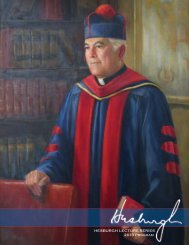HESBURGH LECTURE SERIES 2012 Program - Alumni Association ...
HESBURGH LECTURE SERIES 2012 Program - Alumni Association ...
HESBURGH LECTURE SERIES 2012 Program - Alumni Association ...
You also want an ePaper? Increase the reach of your titles
YUMPU automatically turns print PDFs into web optimized ePapers that Google loves.
James J. McKenna, Ph.D.<br />
Professor, Anthropology; Director, Mother-Baby Behavioral Sleep<br />
Laboratory<br />
Biography<br />
James McKenna is the Edmond P. Joyce, C.S.C., Chair in Anthropology and director of the Mother-Baby<br />
Behavioral Sleep Laboratory at the University of Notre Dame. He also serves on the Health Advisory<br />
Board of La Leche League International. He has served on the executive committees of the American<br />
Anthropological <strong>Association</strong> and Society for Medical Anthropology, and is a member of the American<br />
Academy of Pediatrics. In 2003, McKenna was named faculty fellow by the Kaneb Center for Teaching<br />
and Learning. He obtained his undergraduate training in anthropology at the University of California<br />
(Berkeley), his master’s degree in anthropology at San Diego State University, and his Ph.D. in biological<br />
anthropology at the University of Oregon-Eugene.<br />
At the University of California, Irvine School of Medicine, McKenna pioneered the first physiological<br />
studies of mothers and infants sleeping together (co-sleeping) and apart, using electro-physiological recording technology, and helped give<br />
birth to a new field of study: evolutionary medicine. Although his dissertation research focused on the social behavior of monkeys and apes,<br />
he is currently known for his work in exploring the relationship between SIDS risk factors and parent-infant sleep environments—and for<br />
establishing intellectual links between aspects of human evolutionary biology and research approaches to health and disease. He lectures<br />
nationally and abroad on the importance of re-conceptualizing what constitutes healthy childhood sleep, and along with his undergraduate<br />
students, continues to study family sleeping arrangements and the importance of breastfeeding in promoting the health of mothers and infants.<br />
Lectures<br />
Changing Concepts of Infant Care and Parenting: Sleeping With Baby, Breastfeeding, and<br />
Infant Sleep Position<br />
In the last decade especially, the scientific understanding concerning SIDS, breastfeeding, infant-sleep-position, and co-sleeping with infants<br />
has changed in dramatic ways. In this lecture, both old and relatively new parents will be surprised by how culture and evolution transact to<br />
affect women, infant development, and parenting, and give rise to the question: in how many ways can one successfully raise a human being?<br />
Do Men and Women Speak in Two Different Tongues? If So, Why?<br />
Anthropologists and linguists have noted that, when it comes to understanding language, not only does it appear that nonverbal (body) language<br />
is essential in bringing accurate meanings to social and interactional settings, but failing to appreciate that men and woman are socialized to use<br />
language in very different ways can lead to enormous misunderstandings. Moreover, in attempting to respect rank, by avoiding “direct” speech,<br />
we can, at times, endanger our lives.<br />
Human Aggression: Is it Really in the Genes?<br />
Scientists and social critics alike frequently argue over whether it is our “human nature” or our economic and cultural imperatives that make<br />
inevitable human conflict, violence, and warfare. Yet, a review of human evolutionary history, including the behavior of both monkeys and apes,<br />
points to a very different way of viewing human aggression, one that switches the question around to ask: how is it and how did it happen that a<br />
consideration of history requires us to conclude that humans may well be the most peaceful and altruistic of all? The question is not, why are we<br />
so aggressive? But rather, why are we so peaceful?<br />
The Society that Mistook Its Children for Bats<br />
This lecture reviews western child care practices from the standpoint of human infant biology, western cultural history, cross-cultural<br />
(anthropological) data, and the evolution of human infant vulnerabilities. An objective view of recommended infant child care practices that<br />
favor infants sleeping alone in cribs with minimal, if any, nighttime feedings and contact, reveal that these practices closely resemble the<br />
caretaking patterns of many bat species, but not primate species—the order of mammals to which humans belong. McKenna examines who<br />
human infants are, what they need for healthy development, and how these social ideologies became entwined with—and mistaken for—<br />
empirically validated knowledge about human infant biology. This confusion continues to impact both parents and children negatively.<br />
Stone Age People in a Space Age World: Changing Concepts of Health and Illness<br />
This lecture is based on McKenna’s edited book Evolutionary Medicine, that explores how new ways of conceptualizing, defining, preventing,<br />
and potentially curing human illnesses and degenerative diseases are shown to be emerging from an unlikely source—models of human<br />
evolutionary biology. This lecture furthers the understanding of natural selection and shows that evolution is alive and well in the new<br />
millennium, and ready to emerge in our physicians’ offices. It also discusses medical research and patterns of healing.<br />
70 The Hesburgh Lecture Series, <strong>2012</strong> <strong>Program</strong><br />
Categories<br />
Family, Science, Social<br />
Concerns



